- Home
- Francine Rivers
The Prince: Jonathan Page 2
The Prince: Jonathan Read online
Page 2
“We are at the Philistines’ mercy, Mother. Would you have us sit and do nothing?”
“My father, Ahimaaz, was a great man. He said we must trust in the Lord. God is our king.”
“God has abandoned us.”
“Men who say such things have no faith, and without faith, we have no hope.” His mother raised her hands in frustration. “I know, I am but a woman. What could I know?” She raised her chin, dark eyes sparkling. “But I do know that you are my son. You are the grandson of Ahimaaz. Listen to his words, not mine. If a man is going to follow God, he must align himself with men of God. Samuel is God’s anointed prophet. He speaks God’s Word. Listen carefully to what he says.”
“I wasn’t in Ramah.” How did she know so much of what was said there?
“I wish you had been. You’d have heard for yourself the words of the prophet rather than hearing your mother repeat what she overheard.” She sighed. “I came to say that many things could change and it could happen quickly. While you work in the fields, pray. Ask the Lord what He requires of you.”
And what did the Lord want of him but to fight, to drive the idol worshipers from the land?
His mother studied him. Her eyes darkened and grew moist. She shook her head slowly, rose, and walked away.
A day passed, then another, and Jonathan’s father and Jehiel did not return. His mother said nothing.
The men gathered at Kish’s table and complained about the Philistines; then complained about Samuel’s corrupt sons, who were now assigned to rule over Israel. Jonathan sat with his younger brothers—Malkishua, Abinadab, and Ishbosheth—and ate in silence, worrying about his father.
Saul’s cousin Abner cut off a portion of roasted goat. “Samuel was not pleased when we met with him at Ramah. He took our request for a king as a personal affront.”
Kish dipped bread into the bowl of lentil stew. “He is not long for this world, and we need a man to rule before he goes the way of all flesh. There are none like Samuel in the land.”
“All too true! But his sons are despicable.”
“They hold court in Beersheba and collect tribute like pagan kings!”
One of Jonathan’s uncles reached for a cluster of grapes. “They have been helpful in the past.”
Kish gave a harsh laugh. “Only because we paid them larger bribes than those who complained against us! Joel and Abijah cannot be trusted. They are greedy and will turn their rulings to whomever gives them what they want.”
“And what they want changes from one day to the next.”
“How does a man like Samuel come to have sons like those two?”
“Kish, you convinced Samuel, didn’t you, my brother? He said we would have a king.”
Kish poured wine. “The question is when? And who will it be? A Judean? So it will be, according to Jacob’s prophecy.”
“There is not a Judean worthy enough to rule over us!”
“Why not you, Kish? You are rich.”
Kish’s brothers and sons, equally ambitious for the tribe of Benjamin, were quick to agree.
“You are a leader of Israel.”
“The greatest among all the tribes.”
“You have influence.”
“The other tribes grumble, but it is clear their elders look to our house to rule.”
Kish’s dark eyes glowed with fire. “I know they look to us, but I am an old man. It will take someone younger and stronger than I, a man of stature who will impress the other tribes enough to convince them to stand behind him.”
Jonathan leaned in to listen. There was no man taller nor of more regal bearing than his father, Saul.
“The twelve tribes must be unified. We need a king like the nations around us, a champion who will go out and fight for us.”
Jonathan thought of his mother’s words about Ahimaaz. Ahimaaz had been killed by Philistines, and Jonathan had few memories of him, other than that he had not been like Kish. Kish was angry. Loud. Always making plans for war. Ahimaaz had taught Jonathan to say, “Trust in the Lord and the power of His strength.” Kish believed God helped those who helped themselves. And Kish ruled the men gathered in this room. They all believed that the Lord had left them to protect themselves, and to stand against the Philistines meant they must adopt the ways of the nations around them, nations who had powerful kings and large armies. Some even thought the gods of Philistia were more powerful than the God of Abraham, Isaac, and Jacob. How else could they be so oppressed by the Philistines?
Kish tore off another piece of bread. “Samuel said God will give us what we want.”
Every man in the room knew who Kish had in mind. The men had talked often among themselves. Saul stood a head taller than any other man in Gibeah, and he had the famed handsome features of the Benjaminite tribe, descended from the youngest son of Jacob’s beautiful and favored wife, Rachel. Men—and women—stared every time Saul attended one of the religious festivals, not that he attended often. He would rather plow, plant, and harvest crops than attend religious services, even though he was required to go three times a year. Saul looked like a king even if he had no ambitions to become one.
Jonathan knew it didn’t matter what Kish wanted. God would tell Samuel whom to choose.
As much as he loved and respected his father, he could not imagine Saul as king.
But if not Saul, who? Abner? He was an able leader, fierce and uncompromising. Or Amasa, Abner’s brother? Both were men of courage and strength, always talking over plans of how they would drive the Philistines from the land if God would just give them a king to pull the tribes together. They could talk, but could they lead?
Jonathan looked around at his relatives. They were all eager for a king, intent upon having one whether Samuel liked it or not. If his father were made king, it would change everything. Jonathan felt a rush of apprehension at the thought that he would then become the heir to the throne.
His mother’s words pricked his spirit: “Trust in the Lord. He is our king.”
Then why didn’t the Lord destroy their enemies? Why did He allow the Philistines to oppress them? If God still cared, why didn’t He deliver them? He had sent Moses. He had sent others. Every now and then, it seemed the Lord awakened to their need and sent a man to deliver them. But years had passed and no one had come. The only Word they had from God came through Samuel, who said they were at fault.
What was left, then, but for every man to do what was right in his own eyes? For it was certain no one had confidence in Samuel’s sons to make decisions with the wisdom and justice of their father.
Jonathan had heard Samuel speak only once, but still remembered how his heart had quickened when the prophet reminded the people how their forefathers had been slaves in Egypt, and how God had sent Moses to deliver them from bondage. God had sent the plagues to free them from Pharaoh, had given the people water in the desert, and rained manna from heaven. God had opened the Red Sea to save Israel and then closed it over Pharaoh’s army. Whatever the people needed, God had provided. All the years they wandered in the wilderness and suffered under the blazing desert sun, they had water and food enough. Their shoes and clothing never wore out. When all those who had refused to trust in the Lord died, their children crossed the River Jordan and claimed the land God promised. Canaan, a land of milk and honey.
Samuel said the Lord their God had driven out many of the Canaanites before they came, and then commanded His people to drive out the rest. The Lord had tested them to see if they would follow His commandments with single-minded determination. As long as Joshua, then Caleb, then Othniel lived, they had obeyed. But eventually, the people had grown tired of fighting and had given up trying to wipe the land clean. So what if a few enemies survived in caves and crags? God’s people had tried, hadn’t they? Surely God couldn’t expect more of them than that. It was too much work to hunt the stragglers down and finish them off. What harm to leave them alone? It was time to enjoy the crops, the flocks and herds, the fruit trees ready for harvest.
It was time to savor the milk and honey!
But the surviving enemy had been like weeds. They grew quickly and spread.
And now, here were the Philistines—a garrison of them—only a few hills away. These people from the sea were powerful, armed, and arrogant. And they moved farther inland every year. No one in Israel did anything to drive them from the land. No one dared, especially now that not a single blacksmith could be found to forge a weapon. And how could twelve disparate tribes with countless leaders unite and fight against the organized forces that moved beneath the command of a king?
“We need a king like they have. Without a king to unite us, we are defenseless.”
“When a king unites us, we won’t have to live in fear, wondering from one day to the next whether marauders are going to steal our crops and animals.”
Animals!
Jonathan felt a rush of fear. His father had not yet returned. How long did it take to find a few donkeys?
God, please bring my father home safely.
Did God even hear their prayers anymore? Had the Lord abandoned them, as some of his relatives claimed? Did the Lord expect them to live by their own strength and cunning?
Samuel said if they returned to the Lord, the Lord would deliver them from their enemies. But Jonathan didn’t understand what the prophet meant. How had he left the Lord? The Philistines continued to encroach bit by bit, taking more territory, striking at every weak place, building strongholds. And God did not stop them. He did not intervene and sweep His mighty hand across the land, even though from history, Jonathan knew it would be a small thing for the God who sent ten plagues upon Egypt to send another plague or two upon the Philistines! Why didn’t He?
His mother had told him that his grandfather Ahimaaz used to say, “Every trial that comes will strengthen or weaken our faith.”
The Philistines increased in number and power every year. They dressed in their fine-colored garments and armor, their thick hair like braided crowns, heads high, armed to kill, quick with mocking laughter and unleashed passion before their idols. They were a sight to see! Did their gods exist? How else did they come by such confidence in themselves and disdain for others? They were the conquerors, making themselves rich off those they oppressed. Israel was stripped while God remained silent.
“The Lord has spoken to Samuel and told him a king will be chosen.” Kish put his wine goblet down. “Either he agrees that we need a king, or he no longer plans to rule.”
Did Kish mean God or Samuel? Either way, Jonathan felt a chill spread through his blood.
Could his father or any other man effectively rule Israel? Whenever the elders gathered, they bickered. They might believe in God, but they distrusted one another.
Jonathan’s mind wandered.
What must it have been like to live beneath God’s protection—the cloud by day, the pillar of fire by night? What had the manna tasted like? What must it have felt like to see water streaming from a rock? Jonathan often yearned for days he had never experienced. He felt bereft, soul starved.
He used to dream of studying the Law—perhaps even at Naioth, where Samuel was. The Lord spoke to Samuel. Samuel would know the answers to the questions that often plagued Jonathan. What did it mean to trust and obey God? What action should he take to please Him? Clearly, the offerings did not suffice. God was far off, silent. Did the Lord listen to anyone other than Samuel?
As great a man as Samuel was, as honest and upright a judge, he paled next to stories of Moses, who had brought the Law down from Mount Sinai, and Joshua, who had conquered the land. Those had been days when God ruled as king! God had gone out ahead of them in battle and stood as their rear guard. He had hurled hailstones from heaven! Who could stand against a God like that? He had made slaves into free men and frightened sheep into an army of lions.
But where was the army of Israel now? The mighty warriors who once claimed their inheritance had produced frightened sheep that bleated over scant crops and drying water holes, and lived in fear of Philistine wolves.
What if Kish got what he wanted and lived to see Saul crowned king over Israel? Jonathan felt a rush of fear. His father was a farmer, not a warrior. Even now, he might be dead. It should not have taken this long to find the donkeys.
Jonathan gave voice to his concern. “My father has been gone too long. Can I go and look for him?”
Abner frowned. “Saul has been gone a long time.”
Kish considered for a moment, then waved his hand. “It is too early to be concerned, my son.”
“He’s been gone two full days, Grandfather.”
Kish gave a bleak laugh. “One day to find the donkeys, one day to sulk, one day to return. If he hasn’t come home by the day after tomorrow, then I will worry.”
“With your permission, I will go and look for him tomorrow. He could have run into trouble.”
“The boy thinks he could take on some Philistines.”
Jonathan was thirteen and a man. How long before they saw him as such?
“Be quiet. Should we dismiss a son’s love for his father?” Kish’s eyes glowed with pride as he studied Jonathan, but he shook his head. “Your father takes his time because he is angry. He’ll be home in a few days.”
Jonathan wished he could be as certain.
Jonathan heard the cry of alarm. One of the shepherds came running across the field. “The donkeys are at the well.”
Something must have happened to his father! Jonathan took off running. “Grandfather!”
Kish came out. Jonathan told him about the donkeys, and Kish shouted to the shepherd, “Have you seen my son?”
“No, my lord. I’ve seen no sign of him.”
“Let me go.” Jonathan feared they had waited too long already. “Let me go find my father!”
Kish shouted and several men came running.
Jonathan refused to be set aside. “I have to go!”
“Abner will go.”
“Let me go with him.”
Kish grabbed hold of Jonathan’s shoulder. “Go! But do not look for trouble.”
They traveled quickly, stopping to ask if anyone had seen Saul and Jehiel. They had been seen, but had gone on. Jonathan and Abner passed through the hill country of Ephraim, through the area around Shalishah, and on into the district of Zuph, following word of them.
Abner looked perplexed. “The seer lives here.”
Would his father come all this way to ask Samuel where the donkeys were?
Eyes glowing, Abner entered the town of Naioth. “We’ll have news of Saul here. I’m certain of it.”
Yes, Saul and his servant had been there. The town was still talking about him.
“Samuel invited Saul to eat with him.” Men were still talking about the feast. “Samuel had saved the best portion of the lamb for him.”
The best portion? What did that mean? “Why?”
“We don’t know, but Samuel seemed to be expecting him.”
Jonathan looked around. “Where is my father now?”
“Gone.”
Abner’s voice was strained with excitement. “What of Samuel? May we speak with him?”
“He left as well.”
“Did they leave together?” Abner wanted to know.
One elder shrugged while the other pointed. “No. Saul took the road to Bethel.”
Abner grasped Jonathan’s arm. “Let’s go. We must hurry!”
“What do you think happened?”
“We’ll find out when we find your father.”
Saul and Jehiel were not in Bethel. Apparently Saul and his servant had entered the town with three others, were given bread, and had taken the road to Gibeah.
“Maybe he found out the donkeys came back,” Jonathan said.
Abner laughed strangely. “Or maybe something else!”
They came upon others who had seen Saul and were full of news about what had happened.
“Your father joined the procession of prophets coming down from the high place in Gi
beah. He prophesied with them!”
Jonathan’s father, a prophet? How could that be?
Others came near to hear what was being said.
“What happened to the son of Kish?”
“He prophesied!”
“What? Is even Saul a prophet?”
Jonathan pressed in among them. “Where is my father now?”
“He’s gone up to the high place!”
But by the time they got there, Saul and Jehiel were gone.
“How long ago did they leave?”
“Not long.”
Jonathan and Abner ran to catch up. Finally, Jonathan spotted a tall man and a smaller one walking beside him on a distant hill. “Father!” Jonathan shouted and increased his speed. Abner was on his heels.
Saul turned and waited. He embraced Jonathan, pounded him on the back, and grinned.
“We were worried about you and came looking.” Jonathan panted. What was that he smelled on his father? Something sweet. His father’s hair was thick with oil.
Saul greeted Abner.
“What happened to you?” Abner demanded.
Saul’s expression closed. “I’ve been looking for the donkeys.”
Abner stepped closer. “You ate with Samuel!”
Saul lifted his shoulders and turned toward home. “When we saw the donkeys were not to be found, we went to him. Jehiel had a little money with him as a gift.”
“And Samuel took it?” Abner seemed surprised.
“No,” Jehiel was quick to say.
“Tell me what happened.”
Saul glowered at Abner. “Samuel told me to go ahead to the high place.”
Jonathan sensed the subtle change in his father’s demeanor. Something momentous had happened, but he was unwilling to explain.
Abner put his hand on Saul. “What did Samuel say to you?”
Saul jerked free. “He assured us that the donkeys had been found.” He stared hard at Abner. “And they have, haven’t they?”
“Yes.”
Without another word, Saul headed toward Gibeah.
Abner turned in frustration. “Jehiel!” He walked with the servant, speaking quietly. The man spread his hands and shrugged.

 An Echo in the Darkness
An Echo in the Darkness A Lineage of Grace
A Lineage of Grace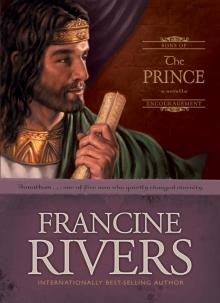 The Prince: Jonathan
The Prince: Jonathan Bridge to Haven
Bridge to Haven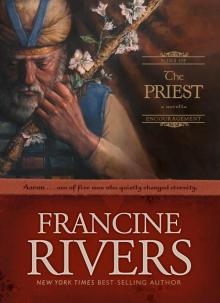 The Priest: Aaron
The Priest: Aaron Her Mother's Hope
Her Mother's Hope Redeeming Love
Redeeming Love The Scarlet Thread
The Scarlet Thread The Masterpiece
The Masterpiece The Last Sin Eater
The Last Sin Eater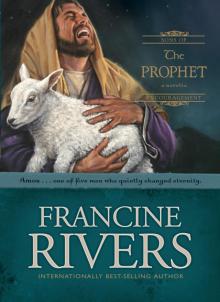 The Prophet: Amos
The Prophet: Amos As Sure as the Dawn
As Sure as the Dawn Her Daughter's Dream
Her Daughter's Dream A Voice in the Wind
A Voice in the Wind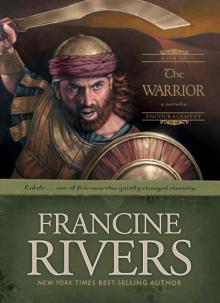 The Warrior: Caleb
The Warrior: Caleb The Scribe: Silas
The Scribe: Silas And the Shofar Blew
And the Shofar Blew The Atonement Child
The Atonement Child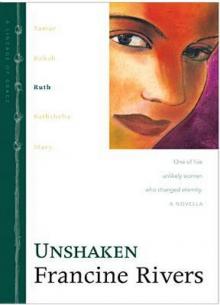 Unshaken_Ruth
Unshaken_Ruth Unspoken_Bathsheba
Unspoken_Bathsheba The Scribe
The Scribe Sons of Encouragement
Sons of Encouragement The Shoe Box
The Shoe Box Sycamore Hill
Sycamore Hill Unafraid_Mary
Unafraid_Mary Marta's Legacy Collection
Marta's Legacy Collection